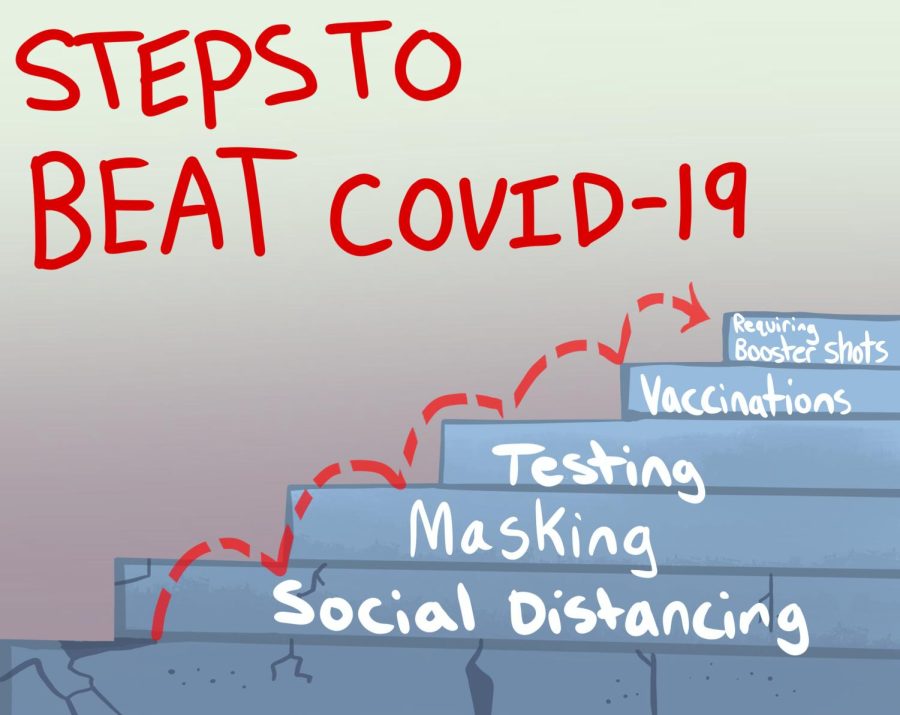Editorial | UI must mandate booster shots
November 17, 2021
As students prepare for journeys home for the holidays, COVID-19 appears to be rising once more for a perfect pandemic storm. As Illini anxiously await fall and winter break, national fears grow toward a possible fifth wave of COVID-19 as infections advance.
Similar to last winter, the returning cold forces individuals inside — leading to increased transmission with everyone together indoors. In contrast to past waves, this potential new cycle arrives as those vaccinated earlier this year have gradually lost antibodies and the Delta variant continuously rages.
Nevertheless, booster shots — i.e., third doses of the vaccine — have entered the fight against COVID-19 as the much-needed supplement to bolster immunity. Fortunately, the University is providing these shots, and students should heavily consider receiving these doses.
Yet, the University must do more than encourage Illini to get a booster. To successfully combat COVID-19, the University must mandate a booster shot for the University population. Especially as spring approaches, the University should require Illini to receive these new vaccines to prevent next semester from becoming ruined by waning immunity and potent variants.`
The Centers for Disease Control and Prevention state that “recent data suggest vaccination is less effective at preventing infection or milder illness with symptoms over time.”
Get The Daily Illini in your inbox!
Describing the natural effect of “decreasing protection as time passes since getting vaccinated, as well as the greater infectiousness of the Delta variant,” the CDC reports those who received the booster shot enjoyed enhanced immunity and longer protection against the virus.
Currently, these doses are reserved for high-risk populations including the elderly, those with underlying health conditions and — critical for Illini — people who work or live in high-risk areas. Meeting CDC criteria, the University now provides booster shots for those who want it.
However, what the University hasn’t addressed is the impending insignificance the term “fully vaccinated” will mean if one doesn’t get a third dose. Although the CDC affirms those fully vaccinated will stay protected without a booster, this will lose its meaning as immunity decreases.
We’re beginning to witness what this dwindling immunity means for society. Chris Wilson of Time Magazine notes an imminent spike in national cases based on the, “trademark flattening of the curve after an extended decline in the pandemic’s perpetual two-month cycle.” Similarly, the University recently exhibited a spike despite the overall 94% vaccination rate.
Being “fully vaccinated” next semester won’t be enough to ward off COVID-19. Besides some immunity remaining, to mitigate COVID-19 at the University, boosters must be required. If the University doesn’t wish to take this needed step, then it must reevaluate its strategy for spring or reintroduce scheduled testing.
In learning to live and adapt to the pandemic, all precautions should be considered. The University is already in the right direction in allowing students to receive booster shots, but more can be done to prevent COVID-19.
This semester saw successful COVID-19 containment largely due to an immense vaccination rate, but what is to happen soon when vaccines lose their strength?
Additionally, encouraging or mandating booster shots is not a compromise or admission that vaccines weren’t effective. As Dr. Albert Shaw asserts for Yale Medicine, “People get confused — or they think something is wrong — when guidance changes with COVID-19, but we have to remember that we are learning about this as we go.”
By requiring boosters, the University takes the necessary step toward what we know now: Vaccines reduce transmission and the illness’s severity, but boosters secure extended protection needed to solve COVID-19.
It’s already a given that next semester won’t be a triumphant return to an unmasked, no social distancing normal. Therefore, for there to be a chance at keeping the present “new normal,” boosters will be our best chance to continue steadily managing the pandemic.







